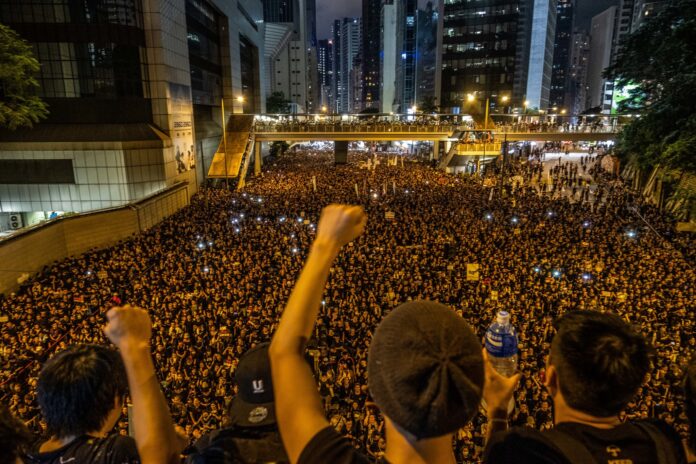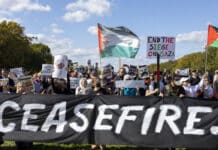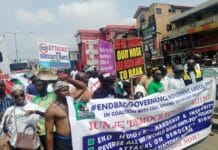Release ‘Long Hair’ and political prisoners in Hong Kong
Solidarity Against Repression in China and Hong Kong
On Monday May 31 ‘Long Hair’ Leung Kwok-hung and 46 other defendants will stand trial for “inciting subversion of state power”. This is the second hearing in the biggest trial to date under the national security law imposed last year by Xi Jinping’s CCP dictatorship. If found guilty, the maximum penalty is life imprisonment.
The first hearing in the case, which began on March 1, was a grim warning of how the new law will be used to crush political dissent. Thirty six of the 47 accused, including ‘Long Hair’, were refused bail and have been held in custody while the police continue their “investigations”. Previously in Hong Kong, bail was normally granted except in very serious cases such as murder trials, under the principle that the accused is innocent until proven guilty. The March hearing dragged on for four days with the defendants denied the possibility to shower or receive a change of clothing. Ten of the defendants fainted and four were sent to hospital including ‘Long Hair’ who suffers from a heart condition.
With this subversion trial the Chinese regime has rounded up almost the entire crop of opposition leaders and proposed candidates, from across the spectrum of anti-government politics, including trade unionists, pro-Western liberals and right wing localists (a Hong Kong nationalist movement). Among them are former legislators like ‘Long Hair’ who was elected five times to the now sidelined Legislative Council (Legco). Xi’s regime has imposed a new political system under which four-fifths of Legco seats will be appointed by a CCP-controlled committee or by business groups, and all candidates will first be screened by the secret police to ensure only “patriots” can run. The definition of “patriots” is those who slavishly obey Xi’s regime and never criticise its repressive policies.
The subversion charge against the 47 is premised on their participation in an unofficial election ‘primary’ in July 2020, just weeks after the national security law was imposed. Over 610,000 voters, an incredibly high turnout, cast their votes in this ‘primary’ to choose which pro-democracy candidates should go forward to stand in the (subsequently cancelled) Legco elections of September 2020. The CCP says the ‘primary’ represented a conspiracy to overthrow the Hong Kong government.
Both winners and losers are charged with subversion. ‘Long Hair’ did not win his primary contest and so would not have been a candidate based on the July result. The fact that a fighter with a proven track record in struggle was eliminated shows the contradictory – even chaotic – political consciousness of the Hong Kong democracy movement. The mass protests of 2019 scaled incredible heights with up to two million people joining marches. They showed tremendous creativity and bravery against huge odds.
Lessons from 2019 movement
The youth who were the driving force of the struggle largely rejected the compromise pan-democratic politicians who previously dominated opposition politics but were increasingly seen as “too soft” and a brake on the struggle – a correct judgement. Unfortunately, the movement’s focus on militant “action” to the exclusion of politics, and its faith in “spontaneity” at the expense of building organised mass structures (democratic committees, trade unions, strike committees and a working class political party), led to the rise of many “new” but politically very limited and confused figures and groupings (radical sounding, but with no strategy or idea of what is needed to win).
The latter also included groups who’s only “strategy”, especially towards the later stages when the movement was becoming exhausted, was to place their hopes in (actually superficial) sanctions from the US and right wing Western governments. Instead of an effective way forward this represents a complete dead-end and a dangerous misunderstanding of what foreign capitalist governments are really about.
Solidarity Against Repression in China and Hong Kong and International Socialist Alternative urge our comrades and supporters to come out and mark May 31 and the national security trial with solidarity protests in cities and towns around the world. In major cities protests at China’s embassies or consulates would be one suitable option, but offices of Anglo-Hong Kong mega bank HSBC could in some countries also be a good focus of protests even in smaller cities and towns (HSBC bosses are complicit in the introduction of the national security law – HSBC’s Asia-Pacific chief executive Peter Wong Tung-shun is a member of the dictatorship’s CPPCC and campaigned for the law).
We demand the scrapping of Hong Kong’s national security law and the release of political prisoners. We stress the need to rebuild mass revolutionary struggle against dictatorship and to spread the struggle to China, linking this with the struggle against capitalism and imperialism which everywhere threatens democratic rights.
The following is the text of a new leaflet from Solidarity Against Repression in China and Hong Kong:
Stop Repression in China and Hong Kong
For grassroots solidarity and internationalism • No trust in Big Business politicians and governments
In Hong Kong since mass anti-government protests broke out in 2019, 10,200 have been arrested. Over 600 have so far been convicted of political offences including “rioting” and “unlawful assembly” with many getting extreme prison sentences of five years or more. The Chinese dictatorship (CCP) calls the protestors “terrorists” and “foreign agents” and imposed a new national security law to crush the democracy movement. Under this law the maximum penalty is life imprisonment.
Hong Kong was once the only part of China with some limited democratic rights. Since the national security law was imposed the city has become a de facto police state. China’s dictator Xi Jinping wants to stamp out the ‘virus’ of democracy, which he fears will spread from Hong Kong to China, but he also wants to project toughness towards the US and Western governments in their deepening Cold War conflict.
Hong Kong repression
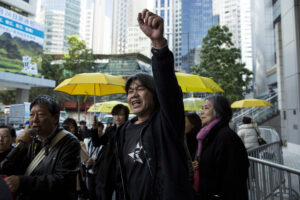
• Over 100 activists have so far been charged with serious offences under the national security law.
• Freedom of speech is effectively crushed under the national security law. The slogan “End one-party rule”, which for many years has been a staple demand of the democracy movement and million-strong marches is now classed as subversion – punishable by life imprisonment.
• The June 4 anniversary of the 1989 Beijing massacre, when hundreds were slaughtered by the army, is a banned topic in China. June 4 has only ever been commemorated in Hong Kong, with 180,000 people attending the 2019 vigil. But in 2021 the Hong Kong vigil is banned for the second year running.
• Hong Kong trade unions are targets of China’s repression. The 3,000-strong Union for New Civil Servants was disbanded in January. Two union leaders, Carol Ng Man-yee of the HKCTU and Winnie Yu Wai-ming of HAEA, have been charged with subversion. Ng resigned as union chairperson and cut her links with the Labour Party in an attempt to reduce her punishment. Several other defendants have also severed all their political connections.
• Veteran left winger and democracy activist ‘Long Hair’ Leung Kwok-hung is among those charged under the national security law. He has already been sentenced to 18 months in jail for “unlawful assembly” under a British colonial-era law – a reminder that China’s government doesn’t have a monopoly on repressive laws.
Repression in China
The situation in China is even worse. Trade unions are illegal, apart from a fake government-run union, the ACFTU, which has never (not once) supported a workers’ strike. Workers are often thrown in jail for going on strike or protesting, especially if they try to organise. Workers’ leaders are accused of being “manipulated by foreign forces”. Feminists are also attacked as “unpatriotic” and “corrupted by foreign ideas”.
In 2018, in the famous Jasic struggle, dozens of left wing youth and self-professed Maoists were jailed and tortured for organising solidarity with striking factory workers. So, a dictatorship that falsely claims to be “Communist” attacks and imprisons actual communists and workers, not only liberal politicians and democracy activists as in Hong Kong.
In Xinjiang, home to 12 million Uighur Muslims, horrific repression is taking place in the name of fighting “terrorism”. The Chinese dictatorship supported the West’s post-2001 ‘War on Terror’ and used this to facilitate its own anti-Muslim crackdown to tighten its control over resource-rich Xinjiang. Uighurs are ruled with discriminatory racist laws and a massive hi-tech surveillance system including mass internment camps. Xi’s regime at first denied the existence of the camps but then changed its stance when the evidence became undeniable – calling them “vocational training schools”!
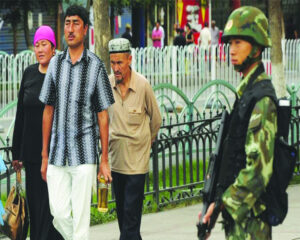
Solidarity Against Repression in China and Hong Kong (SARCHK) is an international campaign launched by International Socialist Alternative (ISA) and our comrades in China, Hong Kong and Taiwan. We have a track record of fighting for democratic rights and in support of workers’ struggles.
SARCHK exposes the real role of the Chinese dictatorship, which is dominated by billionaires – China now has more billionaires than the US – and has one of the world’s worst records on workers’ rights. We also expose the hypocrisy of Western governments’ anti-China rhetoric, which is often used to whip up racism, to cause division, and makes empty claims to promote “democracy” and “human rights”.
Democracy vs. dictatorship
• The US gives military aid to 73 percent of the world’s dictatorships. China can’t top that!
• Britain ruled Hong Kong for 154 years and never once held an election.
• Governments in “democratic” countries always support and prop up whichever regimes enable them to make profits. As Myanmar shows, to fight dictatorship revolutionary mass struggle by workers and young people is needed.
The US, EU and other Western governments and their big corporations worked hand-in-glove with China’s dictatorship for many years. Together they stifled complaints of human rights abuses, even helping China’s police state to develop some of its most advanced surveillance technology. Their sole concern was to make profits from China’s non-union workforce and tap China’s growing market. The new Cold War marks the end of this cosy relationship giving way to growing hostility between Western and Chinese capitalism.
The struggle for democracy – for democratic rights like free speech, freedom of assembly, the right to organise in trade unions and political groups, to go on strike, to stand or vote in free elections, and to kick out a government – these rights have only ever been won through mass struggle, especially workers’ struggle, with the capitalist class on the opposite side of the barricades as is the case in Hong Kong today.
Mass struggle the only way
Democratic rights have never been bestowed by a ruling group or regime, and never by a foreign government or “international community”. This is because real democratic rights and the mass struggle needed to achieve them pose a serious threat to the capitalist system in which a tiny minority hold all the real power.
This is why Solidarity Against Repression in China and Hong Kong is building active grassroots solidarity with the anti-authoritarian struggle in China and Hong Kong, and firmly opposes siding with or supporting any capitalist government. The workers’ movement, social movements of women, youth and oppressed minorities, these are the only forces that can defeat repressive regimes.
To support our campaign, discuss action and get information about our activities in your country and locality contact [email protected]
What we stand for:
No to the national security law in Hong Kong.
Free political prisoners in Hong Kong and China. Rebuild and spread the mass democracy struggle.
End mass detention, forced labour and discrimination against Uighurs and national minorities. For a united multi-ethnic movement against dictatorship.
For independent trade unions and the right to strike. Organise trade union solidarity with workers in China and Hong Kong.
International solidarity – no to nationalism, imperialism and the new Cold War.

